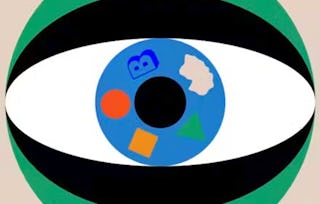In this course, critique is defined as a detailed, objective analysis of a work of graphic design and its effectiveness. Critique is an integral part of the making process for designers: it’s not just how we determine if a work of design is or is not successful, it’s how we move our work forward. Critique is also where other voices and opinions can be brought into the design process.

The Language of Design: Form and Meaning

The Language of Design: Form and Meaning


Instructors: Randy Nakamura
132,377 already enrolled
Included with
905 reviews
What you'll learn
Recall and explain a lexicon of key terms relating to form, meaning, and audience, and apply them successfully within an appraisal of graphic design
Establish and articulate criteria for successful outcomes in a design project that are not limited by personal taste.
Employ various ways of talking about visual form, meaning, and context for a given work of design in an objective way.
Develop an ability to engage with a work of design in an objective way.
Skills you'll gain
Details to know

Add to your LinkedIn profile
See how employees at top companies are mastering in-demand skills

There are 5 modules in this course
In this module we'll explain what this course is about and share guidelines surrounding our expectations for course communication and assignment submissions.
What's included
7 videos8 readings1 discussion prompt
This module provides an introduction to the larger ideas and cultural discussions that graphic design work inhabits, and some terms and ideas used within graphic design. We won't be covering a comprehensive dictionary of graphic design terms, but rather introducing a functional language used in the discussion of graphic design in a critique context. We will also discuss and analyze specific works of design and how they relate to the larger cultural context in which design operates, and why this is important. We will also learn about critique culture, and the importance of analyzing work based on subjective criteria rather than personal taste or subjective opinions.
What's included
5 videos2 readings1 assignment1 peer review1 discussion prompt
In this module we will introduce key concepts and terms used in the critique of visual form in design work. We will cover basic terms used in the discussion of visual contrast, composition, and hierarchy. We will also discuss how to establish a vocabulary for the evaluation of visual form, and use that vocabulary in conjunction with the designer’s intention and the function of the work to build a framework to structure critique.
What's included
11 videos2 readings1 assignment
In this module we will focus on ways to describe and evaluate meaning in works of visual design. Using connotation and denotation as a foundation, the lessons in this module explain a range of approaches for creating meaning, from visual metaphor to cliche and parody. By building cultural literacy and developing research skills, we will practice identifying themes in design work and interpreting design concepts.
What's included
5 videos2 readings1 assignment1 peer review
In this final module, you will synthesize all of the skills you have acquired in the previous modules into a structured critique of graphic design work. As you will see, this module is weighted much more heavily toward assessment and practice than previous modules. Assessing the success of a finished piece of design is difficult because there are so many variables to consider at the same time. You have learned the basic lexicon and syntax for talking about design. Now is the time to put all of these skills together to talk about a piece of design in a holistic and effective way.
What's included
7 videos1 assignment1 peer review
Instructors


Offered by
Explore more from Music and Art
 Status: Free Trial
Status: Free TrialUniversity of Colorado Boulder
 Status: Free Trial
Status: Free TrialCalifornia Institute of the Arts
 Status: Free Trial
Status: Free TrialCalifornia Institute of the Arts
Why people choose Coursera for their career

Felipe M.

Jennifer J.

Larry W.

Chaitanya A.
Learner reviews
- 5 stars
75.02%
- 4 stars
18.56%
- 3 stars
3.09%
- 2 stars
1.32%
- 1 star
1.98%
Showing 3 of 905
Reviewed on Oct 27, 2024
I've enjoyed taking this course, and I'm sure that it will be of great use the next time I take part in a debate about graphic design.
Reviewed on Oct 21, 2024
The accent of the second narrator was terrible, he didn't speak understandable. But I liked the content of the course and the other narrator as well.
Reviewed on Feb 7, 2022
This course has helped me refreshed concepts of design as well as learning ways to see and speak about a design. I highly recommend it .

Open new doors with Coursera Plus
Unlimited access to 10,000+ world-class courses, hands-on projects, and job-ready certificate programs - all included in your subscription
Advance your career with an online degree
Earn a degree from world-class universities - 100% online
Join over 3,400 global companies that choose Coursera for Business
Upskill your employees to excel in the digital economy
Frequently asked questions
Besides a computer or mobile device and access to the internet, no specific software or tools are required to complete this course.
To access the course materials, assignments and to earn a Certificate, you will need to purchase the Certificate experience when you enroll in a course. You can try a Free Trial instead, or apply for Financial Aid. The course may offer 'Full Course, No Certificate' instead. This option lets you see all course materials, submit required assessments, and get a final grade. This also means that you will not be able to purchase a Certificate experience.
When you purchase a Certificate you get access to all course materials, including graded assignments. Upon completing the course, your electronic Certificate will be added to your Accomplishments page - from there, you can print your Certificate or add it to your LinkedIn profile.
More questions
Financial aid available,
¹ Some assignments in this course are AI-graded. For these assignments, your data will be used in accordance with Coursera's Privacy Notice.


